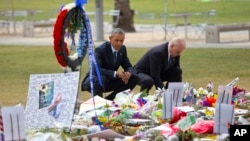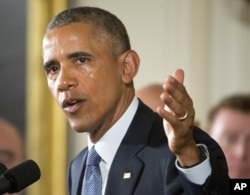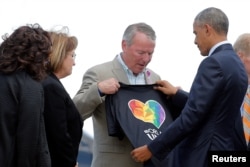"Healer-in-chief" is not a distinction any president would likely have ever sought.
President Barack Obama's hastily arranged trip to Orlando, Florida, after the massacre at the Pulse nightclub marked the 10th time he has traveled to the site of a mass shooting to comfort bereaved families.
On Thursday, the president again found himself in the role of a consoling father, speaking to those affected by the worst mass shooting in U.S. history, which left 49 people dead and 53 injured.
Family members who have been consoled by this president in the past say they remember his "real hugs" more than anything else.
He referenced those hugs Thursday in his remarks at a makeshift memorial in downtown Orlando: "Today, once again, as has been true too many times before, I held and hugged grieving family members and parents, and they asked, 'Why does this keep happening?' And they pleaded that we do more to stop the carnage. They don't care about the politics. Neither do I."
'Symbol of the country'
Ahead of Thursday's trip, White House press secretary Josh Earnest said the president sees these condolence trips as a solemn responsibility: "The president understands that he is a symbol of the country, and when he travels to a community and meets with a family that has endured a terrible tragedy, he's offering a message of condolence and comfort on behalf of the American people."
These one-on-one meetings do take a personal toll on Obama. "It would be impossible for him to not be personally affected by these kinds of conversations and these kinds of interactions," Earnest said, adding that the president draws on his religious faith for strength during these occasions.
Obama has said that meeting with the parents who lost their young children in the Sandy Hook Elementary School shooting in 2012 was the "hardest day of his presidency."
He has traveled to Tuscon, Arizona, and Aurora, Colorado, to comfort families, and to other cities after other shootings.
Exactly one year ago Friday, a white gunman shot and killed nine African-American church members at Emanuel AME Church in Charleston, South Carolina, during a Bible study meeting. Obama went to that church to comfort family, friends and loved ones, singing the hymn “Amazing Grace” from the pulpit.
Brandon Rottinghaus, a professor of political science at the University of Houston in Texas, told VOA that during times like these, the president tries to help Americans come to terms with senseless violence.
"When these kinds of events occur," Rottinghaus said in an interview, "the public really does look to the president as a true national healer, and somebody who can make sense of the situation, but who can also lend a shoulder to be able to understand what this means in the grand scheme of things."
National unifier
Rottinghaus said the framers of the U.S. Constitution intended the president to be a national unifier — a difficult role in an election year like this, when the country is deeply divided.
Obama seems to have grown into this role during his time in office, the professor said.
"I think that President Obama came into office as somebody who people thought was a little bit aloof and a little bit too cerebral," Rottinghaus said. "This is an opportunity for him to show that he is a much more emotive president in the mindset and in the mold of Bill Clinton, or other presidents who had ... bigger personalities."
This president has done a good job of being emotionally available to victims' families, Rottinghaus said, but the emotional toll involved is such that the role of "national healer" is one that that the president may not mind relinquishing when his term ends and he leaves the White House in January.















